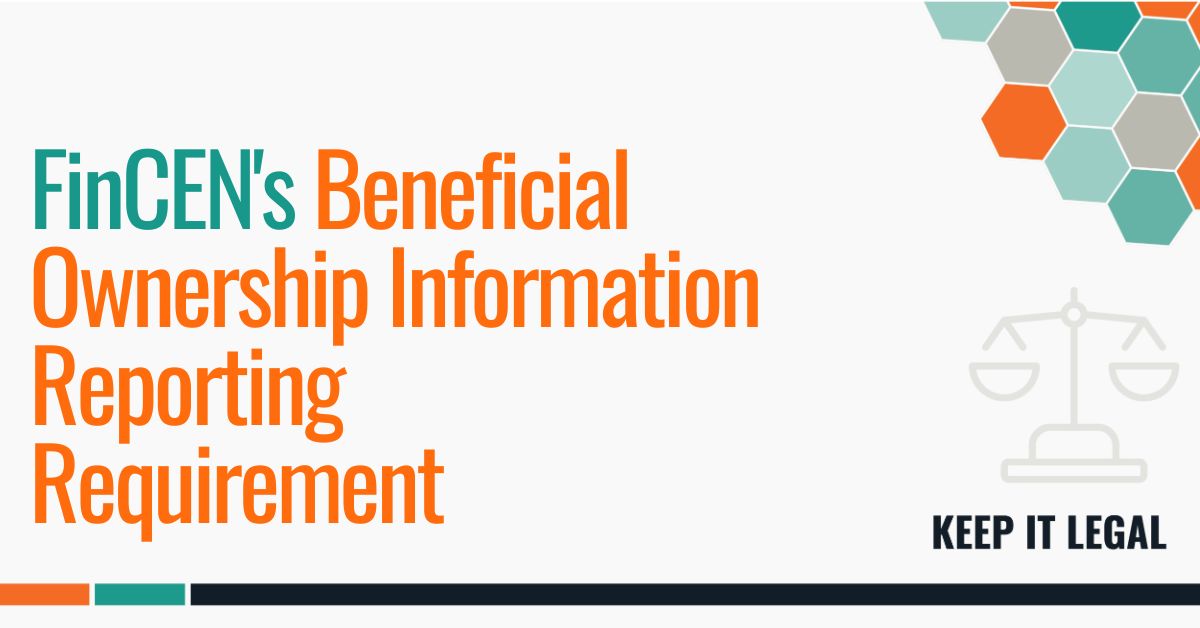As of January 1, 2024, the U.S. Treasury Department’s Financial Crimes Enforcement Network (FinCEN) has imposed a new obligation on almost all corporations and LLCs doing business in the U.S. Companies that fall under this obligation (“reporting companies”) must file reports containing identifying information of certain individuals, with a limited number of exceptions. This is an ongoing obligation – meaning, it’s not necessarily a one-time filing, these reports are required when certain changes are made to the company. In this post, I’ll go over some of the details.
Which Companies Does This Apply To?
The rule does not apply to companies that fall within certain enumerated exceptions. But most small and medium-size companies won’t qualify for the exemptions. Exempt companies include larger entities that employ more than 20 full-time employees and have greater than $5 million in annual gross revenue or sales, investment companies, and certain entities registered with the SEC. So if you are operating a smaller or newer business, these obligations will most likely apply.
When Do We Have to Comply?
If you are starting a new company beginning on January 1, 2024, the filing must be completed within 90 days of the formation of the company. If you have an existing company, you have until the end of calendar year 2024 to comply.
Whose Information Must Be Reported?
Reporting companies must provide FinCEN with information about the company’s “beneficial owners”.
A beneficial owner is an individual who either directly or indirectly: (1) exercises substantial control over the reporting company, or (2) owns or controls at least 25% of the reporting company’s ownership interests. Generally speaking, #1 means that information must be provided for the company’s senior officers (such as CEO, President, COO, CFO, and General Counsel), and anyone who has input on budget approval, major expenditures, or other significant company decisions.
There is no easy, black-and-white rule to determine who is or is not a “beneficial owner”. I would recommend that the requirement be understood to be very broad – if there is a person who might fit any of the requirements listed above, they should be considered a beneficial owner who is subject to the obligations of this rule.
What Information Is Required?
For each beneficial owner, the company must provide to FinCEN:
- The individual’s name;
- Date of birth;
- Residential address; and
- An identifying number from an acceptable identification document such as a passport or U.S. driver’s license, and the name of the issuing state or jurisdiction of identification document (along with a photo of the document).
This information won’t be (easily) available to the public – FinCEN’s website says, “Beneficial ownership information reported to FinCEN will be stored in a secure, non-public database using rigorous information security methods and controls typically used in the Federal government to protect non-classified yet sensitive information systems at the highest security level.”
Once the initial report is filed, there is no annual obligation to update it – rather, it must be updated within 30 days of a change to the information about the company or its beneficial owners. Meaning, if a new senior officer is appointed, or someone else becomes a beneficial owner, or one of the beneficial owners leaves the company, an updated report must be filed.
So, for example, if Sally owns 20% of your LLC, and she gains an additional 5% equity such that she now owns 25%, she is now a beneficial owner, and the company must report that information to FinCEN within 30 days of the change becoming effective.
What are the Penalties for Noncompliance?
According to FinCEN’s website, “a person who willfully violates the BOI reporting requirements may be subject to civil penalties of up to $500 for each day that the violation continues. That person may also be subject to criminal penalties of up to two years imprisonment and a fine of up to $10,000.”
Given the severity of those penalties, it’s recommended that companies review their obligations regarding these reports on at least a quarterly basis, as well as any time the company’s beneficial ownership might have changed.
Much more information can be found on FinCEN’s Beneficial Ownership Information Reporting FAQ page.
If you would like assistance complying with FinCEN’s Beneficial Ownership Information Reporting requirement, please contact me.


